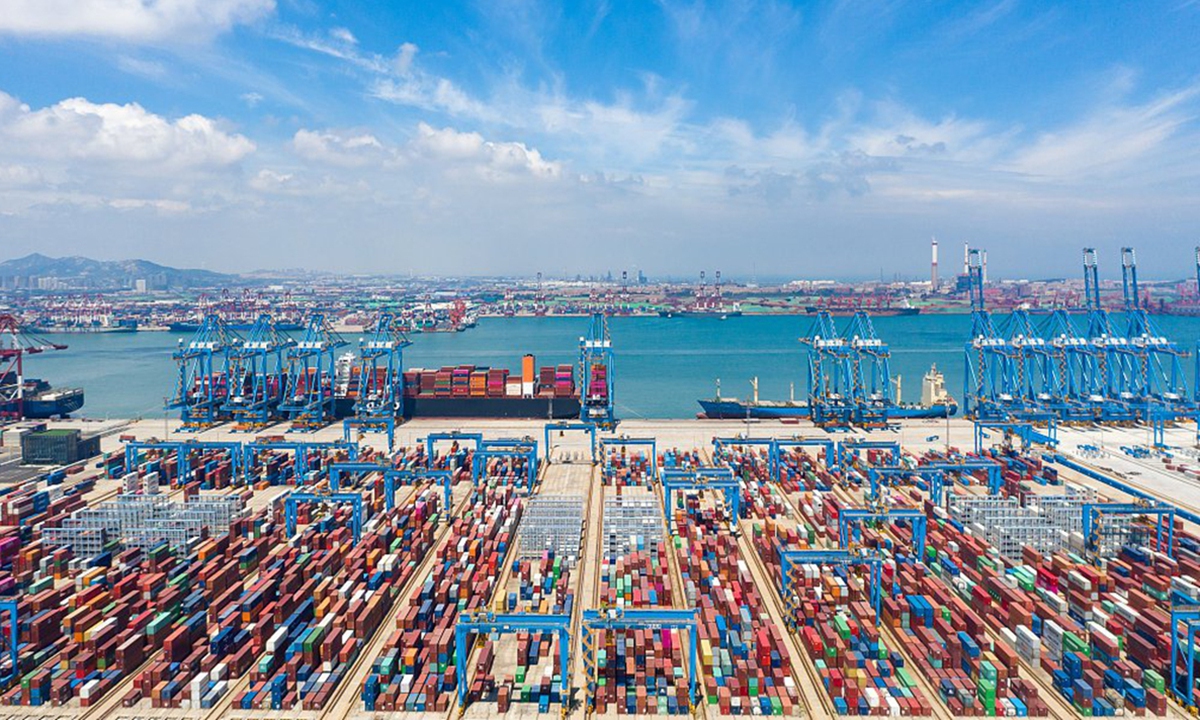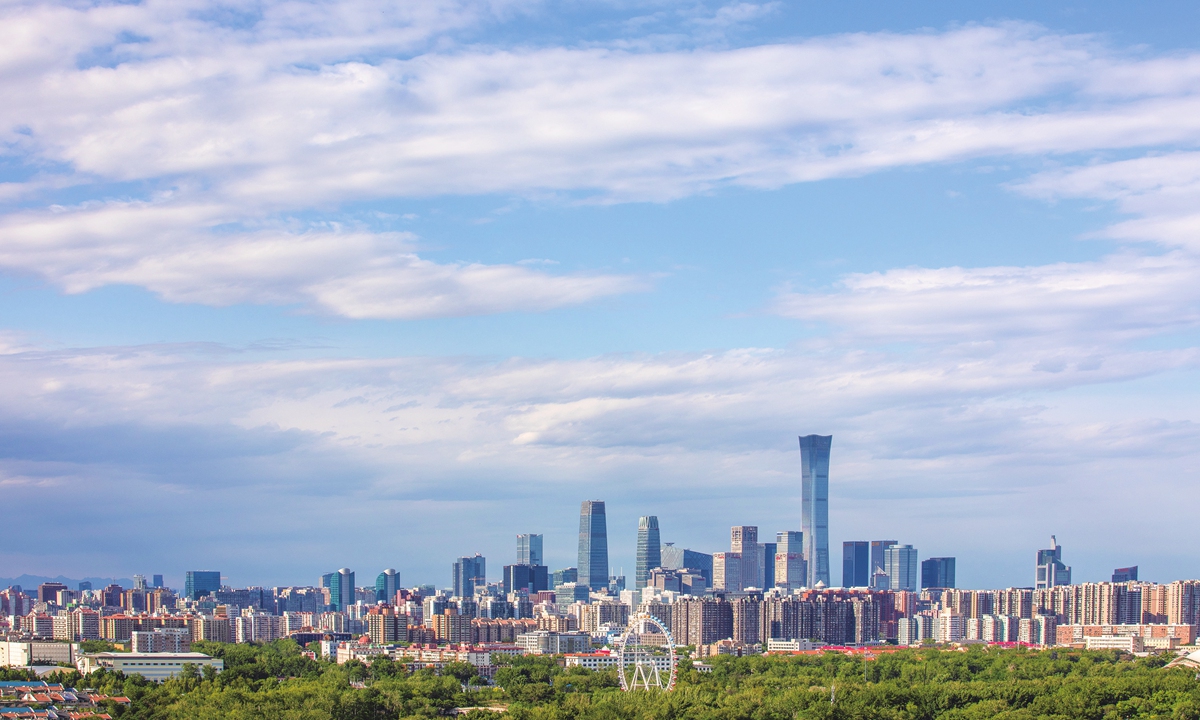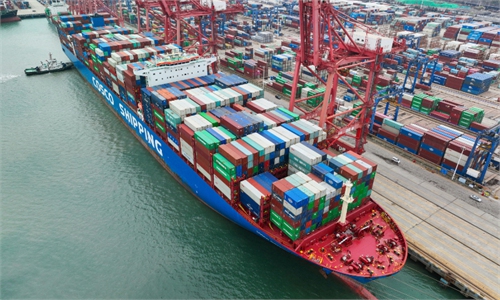Top CPC meeting charts China’s policymaking for 2024; sends strong signal of strengthening economic vitality and confidence

China trade economy File photo: VCG
A meeting attended by China's top leaders on Friday called for strengthening economic vitality, containing risks and improving social expectations so as to cement and strengthen the positive momentum of economic upturn, as part of the economic assessment and policymaking for 2024.
The key gathering, which is assumed to come ahead of the annual Central Economic Work Conference (CEWC), puts the focus on a stable economic rebound and is set to boost market confidence, economists said. They expressed confidence in achieving the pre-set annual GDP growth target of around 5 percent this year, while expecting the country to continue being a leading engine of global growth next year.
The Political Bureau of the Communist Party of China (CPC) Central Committee on Friday held a meeting to analyze and study the economic work of 2024, arrange Party conduct and anti-corruption work, and review regulations on the CPC's disciplinary action, the Xinhua News Agency reported.
The country should strengthen counter-cyclical and cross-cyclical adjustments of macro policies and continue to implement a proactive fiscal policy and a prudent monetary policy. The proactive fiscal policy should be appropriately intensified and improved in quality and efficiency, while the prudent monetary policy should be flexible, appropriate, targeted and effective, according to the meeting, calling for more consistency in macro-policies.
The meeting stresses stable macro-economic policies, which underscores top officials' positive attitude on the fundamentals of the economy and gives reassurance to all industries, Cao Heping, an economist at Peking University, told the Global Times on Friday.
That it specifically pointed out the direction of efforts in implementing the fiscal and monetary policies is in line with the expectations of enterprises, Cao said, noting that he expected more positive market responses following the meeting, such as increased investment from the private sector.
Li Xunlei, chief economist at Zhongtai Securities, told the Global Times on Friday that further interest rate and reserve requirement ratio cuts are possible in 2024.
Efforts should be made to expand domestic demand and form a virtuous cycle in which consumption and investment promote each other. We need to deepen reforms in key areas and continuously inject strong impetus into high-quality development, the meeting said, noting that a modern industrial system will be built led by sci-tech innovations so as to increase the resilience and security of supply chains.
The meeting stressed the country's commitment to high-level opening-up, and vowed to strengthen the fundamentals of foreign trade and foreign investment. Meanwhile, the country will continue to effectively prevent and defuse risks in key sectors and resolutely safeguard the bottom line against systemic risks.
On Wednesday, the Central Committee of the CPC held a symposium with non-CPC personages to solicit opinions and suggestions on this year's economic situation and economic work for the next year, according to Xinhua on Friday.

A view of the skyline of Beijing's CBD area Photo: VCG
Policy to be charted
The December meeting of the Political Bureau of CPC Central Committee - which is routinely held a few days before the tone-setting CEWC - is seen as a prelude to the keenly watched gathering which provides clearer clues to where the Chinese economy is heading over the next 12 months.
Friday's meeting indicates that the upcoming CEWC may emphasize ensuring stable economic recovery, highlighting potential risks and accelerating the building of a modern industrial system for high-quality development, Li said.
Amid challenging internal and external environments, we should maintain the continuity of macro policies so as to dissolve risks and strengthen the economy's internal growth momentum in the process of development, Yao Jingyuan, a special researcher of the Counselors' Office of the State Council, told the Global Times.
Last year's CEWC demanded making economic stability a top priority and pursuing steady progress while ensuring economic stability for 2023. As China navigates its post-COVID-19 recovery, the Political Bureau meeting in July acknowledged that China's economy faces new difficulties and challenges, requiring precise and forceful macro-policies and stronger counter-cyclical regulations.
To better serve the long-term stable development of the real economy, the Central Financial Work Conference, held in October stressed accelerating the building of a nation with a strong financial sector, and effectively forestall and defuse financial risks.
Looking to 2024, the Chinese economy faces multiple challenges including how to solve property and local government debt problems, how to improve private enterprises' expectations and how to expand domestic demand to drive further economic growth. "I'm confident that we're able to solve such problems to maintain relatively sound economic growth," Yao said.
Yang Zirong, an associate research fellow of the Institute of World Economics and Politics at the Chinese Academy of Social Sciences, said next year's government work report will set a reasonable GDP growth goal for 2024, which will be an important driving force for local governments to stabilize economic growth. "In order to achieve the goal, more fiscal stimulus is needed. The central government's deficit ratio could appropriately rise next year, with monetary policies to be further relaxed," Yang told the Global Times on Friday.
Upswing recovery
Experts said the institutional advantages of the socialist market economy, the strengths of its huge market, and the talent advantages brought by a large number of high-quality workers and entrepreneurs form the foundation for China's economy to steadily forge ahead. China will continue its role as a global stabilizer and will contribute about one-third to the world's economic growth this year.
Data released recently also point to the momentum of continuous upswing. According to data released by the General Administration of Customs on Thursday, China's foreign trade expanded by 1.2 percent year-on-year in November, with exports recording the first expansion in dollar terms in seven months.
The country's retail sales of consumer goods reached 4.33 trillion yuan ($605.51 billion) in October, up by 7.6 percent year-on-year, accelerating from 5.5 percent growth in September.
"China remains a leading engine of the world economy. There is no problem for the Chinese economy to grow by over 5 percent year-on-year this year, with its contribution to the global economic growth at above 30 percent," Yao said.
Recently, multiple international institutions have upgraded their forecasts for the Chinese economy, with the Organisation for Economic Co-operation and Development (OECD) projecting the economy will grow by 5.2 percent in 2023 and the IMF saying the economy will rise by 5.4 percent this year, the Xinhua News Agency reported.
UBS economists led by Wang Tao wrote in a note sent to the Global Times on Friday that they predicted China's foreign trade will stabilize in 2024, with exports reversing the declining trend and imports to increase by around 0.5 percent year-on-year.
In contrast to many foreign institutions that are positive about China's economic prospects, US rating agency Moody's Investors Service on Tuesday cut its outlook for China's government credit ratings to negative from stable.
"Moody's action can be ignored," Li said, noting that the debt ratio of the Chinese government is lower than that of most Western developed countries, such as the US.
Yang said Moody's didn't see the central government's resolve and capability to solve domestic economic problems. "Currently, the most urgent problem faced by the economy is insufficient demand, which is more of a cyclical issue and thus can be solved through greater stimulus," he said, noting that if stimulus is carried out in appropriate sectors, the country's structural problems could also be mitigated accordingly.
Li said China is faced with a crucial opportunity for economic transformation and upgrading. "The country's manufacturing sector should be upgraded so as to boost its transformation to a manufacturing power. In the process, more jobseekers will enter the services sector. There is great potential for the development of the services sector in China, as its proportion of GDP is far lower than that of the US, the EU and other developed economies," Li said.



